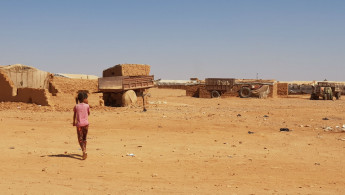UN humanitarian chief seeks extension of aid to civilians in Syria
A UN humanitarian chief appealed for continued aid deliveries to Syria's civilian population.
2 min read
The Syrian regime is denying aid to enter Rukan camp (Getty)
The United Nation's top humanitarian affairs official appealed to the Security Council Monday for continued aid deliveries to Syria's civilian population across borders and through front lines, despite Russia's growing opposition.
Mark Lowcock, UN under-secretary-general for humanitarian affairs, said UN food aid this year had reached an average 750,000 people a month in war-torn Syria.
"Sustaining this is essential for those in need, both providing aid and supporting service delivery," he said.
He urged the renewal for 12 months of UN resolutions authorizing the aid flows, insisting it was "of the highest importance."
Though adopted unanimously in 2014, a Security Council resolution renewing the aid mechanism was approved a year ago by only a 12-3 vote, with Russia, China and Bolivia abstaining. Those authorities are due to expire January 10, 2019.
Moscow, which is allied with the Damascus government of President Bashar al-Assad, argues that cross-border deliveries of humanitarian aide are a violation of Syrian sovereignty.
The food aid is intended to free civilians trapped by war from reliance on either the government or rebels. The government claims, however, the aid supports "terrorists."
Ambassador Jonathan Cohen, the deputy US representative to the United Nations, said renewing the aid "is vital for some five million Syrians who currently depend on these cross-border humanitarian deliveries."
Lowcock also drew the Security Council's attention to conditions at Rukban, an informal refugee camp with some 50,000 people in the desert on the border of Syria and Jordan.
He said the camp's population has not received assistance since January, and they are increasingly desperate.
"There are continuing reports of children dying due to poor sanitary conditions and a lack of healthcare," he said.
France's Ambassador Francois Delattre, who described conditions at Rukban as "nightmarish," said allowing access to aid was incumbent on all parties.
"It is unacceptable that the regime has blocked inter-agency convoys for more than two months now and put in place a punitive strategy to channel the aides to 'reconciled' zones," he said.
Mark Lowcock, UN under-secretary-general for humanitarian affairs, said UN food aid this year had reached an average 750,000 people a month in war-torn Syria.
"Sustaining this is essential for those in need, both providing aid and supporting service delivery," he said.
He urged the renewal for 12 months of UN resolutions authorizing the aid flows, insisting it was "of the highest importance."
Though adopted unanimously in 2014, a Security Council resolution renewing the aid mechanism was approved a year ago by only a 12-3 vote, with Russia, China and Bolivia abstaining. Those authorities are due to expire January 10, 2019.
Moscow, which is allied with the Damascus government of President Bashar al-Assad, argues that cross-border deliveries of humanitarian aide are a violation of Syrian sovereignty.
The food aid is intended to free civilians trapped by war from reliance on either the government or rebels. The government claims, however, the aid supports "terrorists."
Ambassador Jonathan Cohen, the deputy US representative to the United Nations, said renewing the aid "is vital for some five million Syrians who currently depend on these cross-border humanitarian deliveries."
Lowcock also drew the Security Council's attention to conditions at Rukban, an informal refugee camp with some 50,000 people in the desert on the border of Syria and Jordan.
He said the camp's population has not received assistance since January, and they are increasingly desperate.
"There are continuing reports of children dying due to poor sanitary conditions and a lack of healthcare," he said.
France's Ambassador Francois Delattre, who described conditions at Rukban as "nightmarish," said allowing access to aid was incumbent on all parties.
"It is unacceptable that the regime has blocked inter-agency convoys for more than two months now and put in place a punitive strategy to channel the aides to 'reconciled' zones," he said.





 Follow the Middle East's top stories in English at The New Arab on Google News
Follow the Middle East's top stories in English at The New Arab on Google News
![Israeli forces ordered bombed Gaza's Jabalia, ordering residents to leave [Getty]](/sites/default/files/styles/image_330x185/public/2176418030.jpeg?h=a5f2f23a&itok=_YGZaP1z)

